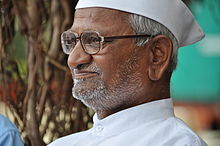Anna Hazare
| Anna Hazare | |
|---|---|

Anna Hazare at his village Ralegan Siddhi, Maharashtra
|
|
| Born |
Kisan Hazare 15 June 1937 Bhingar, Bombay Province, British India |
| Residence | Ralegan Siddhi |
| Nationality | Indian |
| Other names | Kisan Baburao Hazare |
| Known for |
Indian anti-corruption movement – 2012, Indian anti-corruption movement – 2011, Watershed development programmes, Right to Information |
| Movement |
Indian anti-corruption movement, Peace movement |
| Parent(s) | Laxmibai Hazare Baburao Hazare |
| Awards | Padma Shri (1990) Padma Bhushan (1992) |
| Website | www |
Kisan Baburao "Anna" Hazare (![]() pronunciation ,
pronunciation , ![]() pronunciation ; born 15 June 1937) is an Indian social activist who led movements to promote rural development, increase government transparency, and investigate and punish corruption in public life. In addition to organising and encouraging grassroots movements, Hazare frequently conducted hunger strikes to further his causes—a tactic reminiscent, to many, of the work of Mohandas K. Gandhi. Hazare also contributed to the development and structuring of Ralegan Siddhi, a village in Parner taluka of Ahmednagar district, Maharashtra, India. He was awarded the Padma Bhushan—the third-highest civilian award—by the Government of India in 1992 for his efforts in establishing this village as a model for others.
pronunciation ; born 15 June 1937) is an Indian social activist who led movements to promote rural development, increase government transparency, and investigate and punish corruption in public life. In addition to organising and encouraging grassroots movements, Hazare frequently conducted hunger strikes to further his causes—a tactic reminiscent, to many, of the work of Mohandas K. Gandhi. Hazare also contributed to the development and structuring of Ralegan Siddhi, a village in Parner taluka of Ahmednagar district, Maharashtra, India. He was awarded the Padma Bhushan—the third-highest civilian award—by the Government of India in 1992 for his efforts in establishing this village as a model for others.
Hazare started a hunger strike on 5 April 2011 to exert pressure on the Indian government to enact a stringent anti-corruption law, The Lokpal Bill, 2011 as envisaged in the Jan Lokpal Bill, for the institution of an ombudsman with the power to deal with corruption in public places. The fast led to nationwide protests in support. The fast ended on 9 April 2011, a day after the government accepted Hazare's demands. The government issued a gazette notification on the formation of a joint committee, consisting of government and civil society representatives, to draft the legislation.
...
Wikipedia
